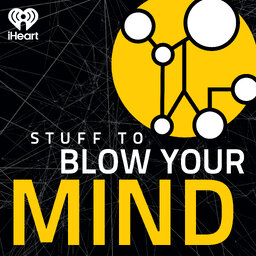From the Vault: Time Traveler Zero, Part 1
Today, time travel fiction is everywhere – and we understand the cosmos enough to even speculate what is and isn’t possible. But how old is the notion of travel through time? What sorts of attitudes and ideas concerning the nature of time were seemingly necessary before humans first imagined firing up a time machine? (originally published 12/14/2021)
In 1 playlist(s)
Stuff To Blow Your Mind
Deep in the back of your mind, you’ve always had the feeling that there’s something strange about re…Social links
Follow podcast
Recent clips

Crab Bag, Part 3: The Crab is a Lonely Hunter
55:55

Weirdhouse Cinema Rewind: La Loba (1965)
1:30:07

From the Vault: Mystery Cults, Part 4
1:00:23
 Stuff To Blow Your Mind
Stuff To Blow Your Mind